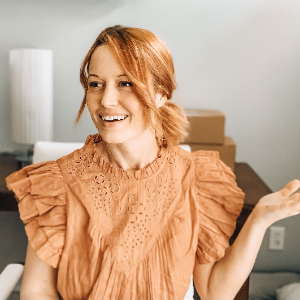Adapting to Living with Less: A Transformative Journey
Nov 08, 2023
Learning to live with less is a process that doesn’t happen overnight for most people. For some, the act of consistently shedding and maintaining an intentional living space comes naturally—largely due to some reasons we’re going to discuss today—but for the vast majority, this is not the case.
Now, tons of psychological studies and phenomena explain why there is such a clutter problem in the world today and why we have trouble letting things go on a more personal level– you can find information on these here.
While that knowledge can be helpful and motivating, it doesn’t explain how to adapt to living with less. Today, I want to chat about why this can be such a struggle and how to overcome it (and find more happiness in the process). I’ll also share 3 tangible tools that can help bend the learning curve along the way!
Stick around to the end because I’m going to be giving away some of my personal favorite tools to help bend the learning curve on your journey to adapting to living with less.
Perception And Discontent
It’s worth mentioning that the rewards of a spacious minimalist haven't, aren’t nearly as great as the process of achieving contentment and, as one author put it, “a sense of mastery…or participation in determining the content of life” -Mihaly Csikszentmihalyi ‘Flow.’
At this point, most of us have figured out that how we feel about ourselves and the world around us (how much happiness we achieve) depends more on how our mind filters and interprets information and experiences than anything else.
Societal and genetic urges
In his book Flow, the author discusses ‘Reclaiming Experience,’ which I found really interesting. He describes social and genetic instructions as two forces of control that, when followed unquestioningly, lead to helplessness and unhappiness.
So, what does that even mean? What are social and genetic instructions? Well, Genetic instructions would be those physically guided urges—things that make us feel good, what we desire, food, alcohol, natural urges, instinct…physical desires.
Social instructions would be desires or rewards that society has agreed are worthy- the nice house, manicured lawn, sports car, the latest technology. Social desires.
This leads to great discontent. People constantly reach for the next prize, which always dissolves and reappears in the distance.
Hello, discontent.
It’s just never quite enough. The more we have access to, the more we realize that external stimuli just don’t bring happiness. As Csikszentmihalyi put it, “This paradox of rising expectations suggests that improving the quality of life might be an insurmountable task.”
Now, of course, you can’t disregard society- it’s there for a reason- or your body -umm, it’s there for a reason too 🤪. But joy and meaning should be found in the ongoing stream of your life experience. Just living. Enjoying doing what you’re doing and being who you’re being in the moment.
Essentially, the key is to master your consciousness. (I’m aware that this sounds really taboo, but it makes perfect sense when you think about it).
Directing Your Thoughts (Or “Ordering Your Consciousness”)
Directing your thoughts, or “ordering your consciousness,” is the core of “intentional living”- no doubt a term you’ve seen and heard around the internet.
You might feel the influence of outside urges- but the complex structure of our nervous system has developed a consciousness that is self-directed (which is just really freakin’ cool). It means, for example, you don’t have to eat when you’re hungry- you can override that biological sensation and choose not to.
You don’t have to follow societal trends and impositions—you can choose to prioritize contentment and focus your attention on peace and joy in your current space.
A Camping Perspective
Camping might sound like a weird metaphor for living with less, but hear me out. It’s the ultimate crash course in adaptability.
On a recent family camping trip, we each had one cup, one spoon, and one plate. Washing dishes after every meal felt awkward at first, but by day two? It was no big deal. The kids didn’t miss their toys. I didn’t miss my memory foam mattress (okay, I missed it a little). We even said “no thanks” to a lantern someone offered us because, by then, we’d adjusted to the dark.
Camping taught me this: We’re hardwired to adapt. And we’re much happier with less than we realize once we get past the initial discomfort.
Why Do We Always Want More?
Here’s the truth: humans are fantasy machines. The moment we see something new or shiny, our brains start imagining how much better life would be if we had it. Couple that with our desire to fit in, and boom! You’re sucked into a cycle of buying, keeping, and eventually regretting.
The whole concept of fantasizing is to imagine something that isn’t already there. (Another advantage of our great consciousness).
That’s not to say that we have no choice in what we choose to live with and purchase. It just highlights that going against the grain will require awareness and intention.
What Do You Completely Forget Exists When You’re Away?
The kids had none of their technology or toys. I didn’t have my memory foam mattress, house slippers, or big pillows. Matt (who’s a major techy) didn’t have his video games and computer. Still, we managed to be happy the entire time. Our expectations (and our environment) had been altered.
Now, I’m not saying we are going to go home and ditch all of our technology and comfort items. If we can be perfectly happy without those key favorite items, imagine how little we need the things that we’ve completely forgotten about!
So, what would those items be for you? How much more space, time, and money would you have? One thing that became incredibly clear to me is that our environments have a huge impact on our ability to adapt to change, including living with less.
Had we been at home, we wouldn’t have been as satisfied with walking a quarter-mile to the bathroom and sleeping without AC. However, a change in environment and expectations made this exact reality almost unnoticeable.
There are 3 tools to add to your arsenal of ways to more easily live with less and really bend the learning curve! Those things are mindfulness, versatility, and spatial constraints.
1. Mindfulness
One of the greatest tools in your arsenal when it comes to learning to live with less is a practice of mindfulness 🧘♀️ (this sounds absolutely yummy to me because I could live in my mind all day 😋).
2 tools that I use regularly to sharpen that practice are meditation and strategic journaling. These help to build on keeping aligned and intentional.
2. Versatility
It becomes much easier to live with less when you have items that perform multiple functions. This way, you never feel like you’re doing without when you ditch the extra gadgets and tools because you have a single versatile item to cover it!
Anywhere you can ease the “loss sensation” when you’re first getting used to letting things go will help. Not to mention, it’s just a smarter and more efficient use of space.
3. Spatial constraints
The third and final key (I might say) to living with less is spatial constraints. I’ve been teaching this powerful practice for years!
This is the bread and butter of clutter-free living!
If you can give yourself firm boundaries for the belongings you use, it becomes easier to let go of the things that don’t fit in those spaces and easier to keep your place looking visually spacious with the items you keep.
Adapting to Living With Less
Adapting to living with less isn’t about deprivation—it’s about discovering the freedom and contentment that comes with intentionally shaping your space and life. By focusing on mindfulness, versatility, and spatial constraints, you can make the transition not only easier but genuinely rewarding.
It’s incredible how quickly we can adapt when we challenge ourselves to step outside of our usual habits and routines. Whether you’re camping with the bare essentials or simply rethinking how much you truly need at home, these small experiments can provide clarity and spark meaningful change.
So, ask yourself: What are you holding onto that no longer serves you? And what might you gain by letting go? Living with less isn’t a one-size-fits-all journey, but with the right tools and mindset, you’ll find it’s one worth embarking on. The rewards—a spacious, clutter-free life filled with intention and joy—are more than worth the effort.



